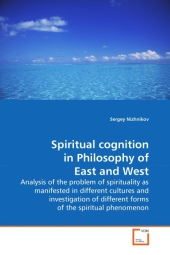 Neuerscheinungen 2010Stand: 2020-01-07 |
Schnellsuche
ISBN/Stichwort/Autor
|
Herderstraße 10
10625 Berlin
Tel.: 030 315 714 16
Fax 030 315 714 14
info@buchspektrum.de |

Sergey Nizhnikov
Spiritual cognition in Philosophy of East and West
Analysis of the problem of spirituality as manifested in different cultures and investigation of different forms of the spiritual phenomenon
2010. 160 S.
Verlag/Jahr: VDM VERLAG DR. MÜLLER 2010
ISBN: 3-639-28568-9 (3639285689)
Neue ISBN: 978-3-639-28568-0 (9783639285680)
Preis und Lieferzeit: Bitte klicken
The aim of this monograph is to elaborate the concept of spiritual cognition, and to lay out its naked essence through an analysis of its manifestations in mankind´s culture (mainly in philosophy and religion). The author shows that faith is an ontological science, as the process of philosophical essential thinking and that they both belong to spiritual cognition and its methods, which use transcendence and existence. The process of spiritual cognition means, from this point of view, unfolding of human being essence and appearing of humanity´s archetype that formulates by different languages, symbols and notions. It is the book for those who seek for universal spiritual truth that can unite and save all the people. But the book at first can be found not to be a very easy reading you have to get into different cultural traditions and use the newest philosophical language as well. But after involving by thyself in the spiritual process of philosophizing you can open for yourself a new planet of sense, morality and spirituality, that can help you to understand as backgrounds of different cultures, so other people around you.
Nizhnikov A. Sergey is a doctor of philosophy, professor of Peoples´ Friendship University of Russia, history of philosophy department. He has more than 150 publications. Sphere of his studies spiritual cognition, faith as a method of spiritual cognition, history of Russian philosophy, Hesychasm, transcendental philosophy (I. Cant, M. Heidegger).


